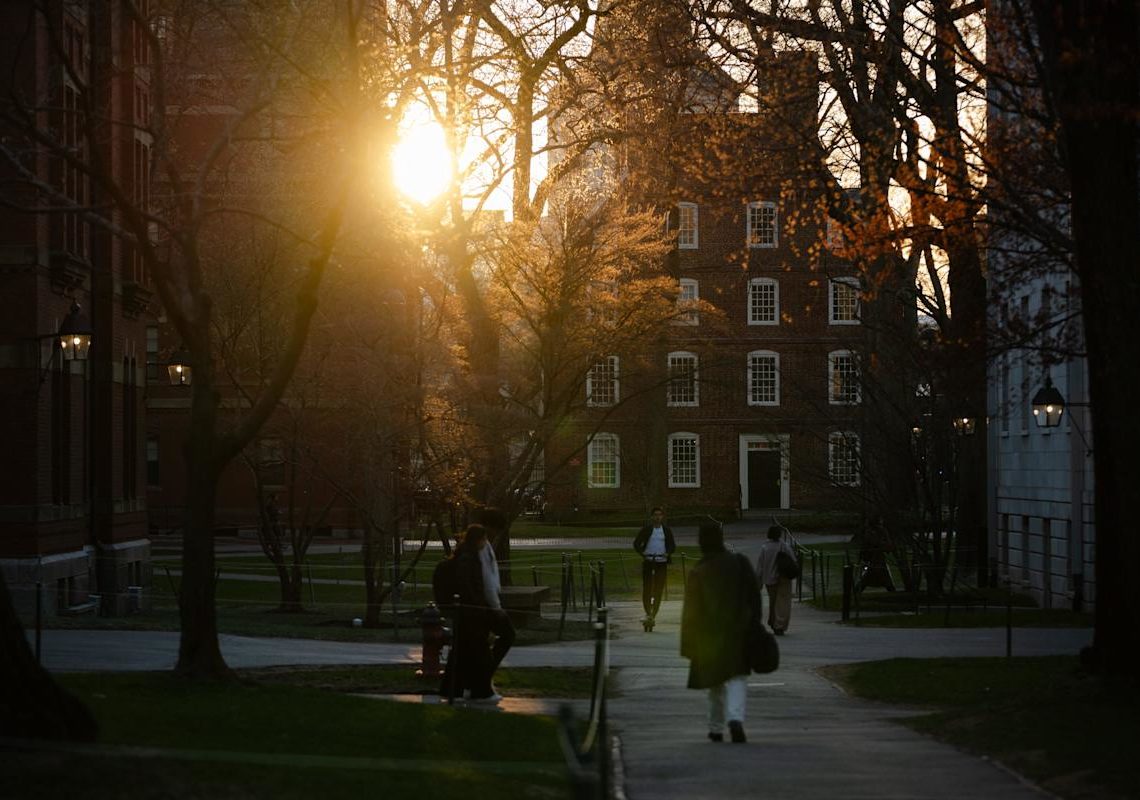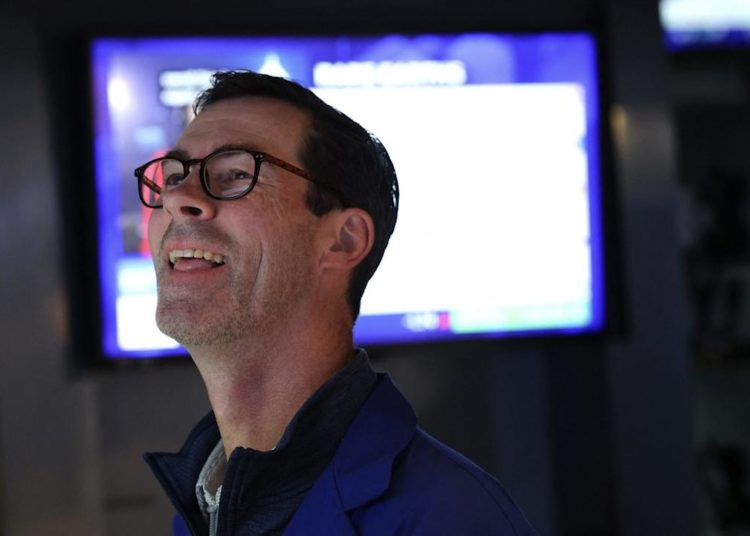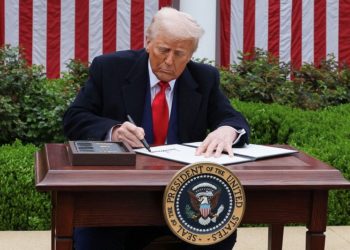WASHINGTON – For Harvard University, the cavalry has arrived.
When the nation’s oldest and richest college first rebuked the Trump administration last Monday amid efforts to force changes to its campus, other powerful universities were quick to come to its defense.
“Harvard’s objections,” wrote Stanford University’s president and provost the next day, “are rooted in the American tradition of liberty, a tradition essential to our country’s universities, and worth defending.”
“Princeton stands with Harvard,” said the president of the school’s New Jersey counterpart.
Even the president of Columbia University – another Ivy League university, which has tried (unsuccessfully) to oblige similar government demands – seemed to offer her support to Harvard.
Trump’s recent directives, she wrote, “would strike at the very heart of that university’s venerable mission.”
The president has repeatedly denounced rising antisemitism on college campuses, including Harvard’s, in the wake of protests sparked by the Israel-Hamas war. Federal funding, his administration has argued, must be contingent on universities following civil rights laws and curbing antisemitic incidents. Yet even the Anti-Defamation League suggested this week that the White House is exerting too much influence over the nation’s colleges.
“Denying federal funds (whether in part or in total) is an extremely serious and rightfully rare punishment that should be used only in the most severe situations with institutions incapable or unwilling to improve,” ADL CEO Jonathan Greenblatt said in a statement Friday.
For defenders of American higher education, the wagon-circling prompted by Harvard’s resistance to the Trump administration this week brought a renewed sense of hope for the future.
Higher ed’s detractors, meanwhile, watched gleefully as the White House doubled down on its punishment for schools that choose to disobey its orders.
Within hours of Harvard’s defiance, the administration froze billions in federal funding for the school. In the days that followed, it began exploring ways to revoke Harvard’s tax-exempt status, threatened the university’s ability to enroll international students and accused it of inaccurately disclosing sources of foreign money.
The escalation signaled the start of a new, more combative phase in President Donald Trump’s efforts to reshape the nation’s colleges.
Read more: With a Republican trifecta in Washington, a new era of college oversight is on its way
“I applaud Harvard University standing up for the shared values of higher education,” said Michael Roth, the president of Wesleyan University, a private liberal arts college in Connecticut. “Federal funding for universities must not depend on a loyalty oath.”
Since Trump took office, many college leaders have watched in despair as his administration has upended the public-private partnership that forms the basis of American academic research. In a matter of months, the federal government has exerted unprecedented pressure on institutions, pausing or outright canceling billions in funding while pushing schools to overhaul their admissions, hiring and teaching practices.
Read more: Trump administration demands widespread changes to Columbia University discipline policies
For months, the question of just how cooperatively to engage with those demands has plagued college presidents. As court battles – over slashed research funding, student visa revocations and diversity programs – have played out quietly, universities have struggled to present a more vocal, unified front against Trump. Every school is different, and some have been more amenable than others in recent months to new kinds of federal oversight.
Columbia University, for instance, largely agreed to a set of reforms the Trump administration laid out as a condition for restoring $400 million in federal funding. The university, among other things, ousted its president, committed to altering its student protest policies and said it would appoint a new administrator to oversee its Middle Eastern Studies department.
Read more: Ivy League school faces ‘critical’ cuts as Trump halts hundreds of million in funding
Still, the Trump administration hasn’t restored Columbia’s funding – a fact viewed by some as an indication that the White House seems to care more about breaking colleges than improving them.
“They want to be seen as attacking campuses,” said Jon Fansmith, the senior vice president for government relations at the American Council on Education, during a webinar Tuesday with college officials. “What they don’t want to do is solve any problems.”
Read more: Trump honored a cancer survivor. The boy’s doctors now face his budget cuts.
Trump imperils Harvard’s nonprofit status
Don Ingber, a renowned biologist at Harvard, woke up this week to a troubling email.
On Monday night, the federal government sent his team a stop-work order for two research contracts worth roughly $20 million. The directives were part of the more than $2.2 billion in funding the Trump administration paused after Harvard resisted its conditions to repair the school’s standing with the federal government.
Ingber’s research supports the creation of what he calls “organ chips” to reduce reliance on animals for drug development. Why an administration that deeply values American innovation and curbing antisemitism would want to jeopardize the cutting-edge work of a Jewish scientist like himself makes “absolutely no sense,” he said.
“American prowess is based on our lead in innovation, and innovative technologies would not exist without science and the synergistic partnership between the government and academia that has existed since the 1940s,” Ingber said. “We are killing it.”
Read more: Amid Trump’s ire, can Harvard afford to lose federal research funds?
Ingber’s stop-work order was just one of Harvard’s woes this week. Trump on Tuesday took to social media to threaten the university’s nonprofit status – a move that is now reportedly being considered in earnest by the Internal Revenue Service.
Rescinding Harvard’s tax-exempt status would be unprecedented, likely costing the school at least hundreds of millions of dollars in federal income taxes. But Trump can’t “simply snap his fingers” and make the change, according to Michael Dorf, a law professor at Cornell University. The effort would surely prompt a challenge in court, where Harvard would have the upper hand legally, he said.
“There is a deep body of IRS regulations and case law making clear that all sorts of controversial statements and activities by universities do not forfeit their tax-exempt status,” he said.
Read more: Trump has revered MIT. The school isn’t loving him back.
International students targeted
Not long after Trump attacked Harvard online, Kristi Noem, his Homeland Security secretary, wrote a letter to the university threatening to imperil its ability to enroll foreign students.
“With anti-American, pro-Hamas ideology poisoning its campus and classrooms, Harvard’s position as a top institution of higher learning is a distant memory,” Noem said in a statement.
International students make up about a third of Harvard’s student population. At Harvard and many other universities, the enrollment of foreign students, who usually pay full tuition, often subsidizes many other expenses, including financial aid for domestic students.
The federal government has never before jeopardized a major university’s enrollment of students from other countries. If the Trump administration follows through on that promise, the potential consequences for Harvard could be devastating.
To James Kvaal, who served as the top official overseeing higher education in the Biden administration, it’s unclear why a White House so focused on reducing trade deficits would target international students. They brought in more than $40 billion to the U.S. economy last year.
“Economically, it’s an export,” he said. “This is a service we’re selling.”
In a statement to USA TODAY on Friday, Harvard spokesperson Jason Newton said the school stands by its original statement defending academic freedom.
“We will continue to comply with the law and expect the administration to do the same,” he said.
Read more: Uncertainty of Trump 2.0 takes some college presidents back to pandemic times
Harvard’s foreign gifts scrutinized
On Friday, the federal Education Department lobbed yet another accusation Harvard’s way: The agency said the school has been inaccurately disclosing foreign gifts and contracts. Linda McMahon, the education secretary, ordered the university to cough up troves of documents for review.
Newton, Harvard’s spokesperson, said the university has filed its necessary disclosure reports “for decades as part of its ongoing compliance with the law.”
After a tumultuous week, the new demand was the latest indication that the feud between Trump and Harvard – and higher education in general –won’t be dying down anytime soon.
“College administrators are always going to choose the path of least resistance,” said Preston Cooper, a higher education expert at the American Enterprise Institute, a right-leaning think tank.
In Trump 2.0, he said, it’s clear many are starting to believe “the path of least resistance is to fight.”
Zachary Schermele is an education reporter for USA TODAY. You can reach him by email at [email protected]. Follow him on X at @ZachSchermele and Bluesky at @zachschermele.bsky.social.
This article originally appeared on USA TODAY: Trump’s battle against higher ed reaches new phase amid Harvard feud
The post A new phase begins in Trump’s battle with higher education appeared first on USA TODAY.




